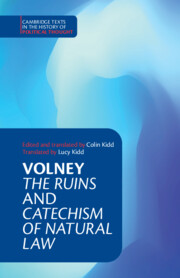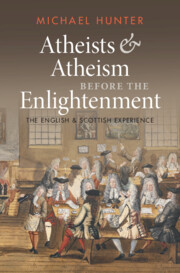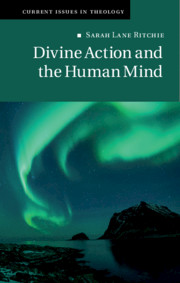19 results

Volney: ‘The Ruins' and ‘Catechism of Natural Law'
-
- Published online:
- 08 February 2024
- Print publication:
- 15 February 2024
Chapter 5 - ‘Aikenhead the Atheist’
-
- Book:
- Atheists and Atheism before the Enlightenment
- Published online:
- 06 July 2023
- Print publication:
- 27 July 2023, pp 94-122
-
- Chapter
- Export citation
Chapter 1 - Introduction
-
- Book:
- Atheists and Atheism before the Enlightenment
- Published online:
- 06 July 2023
- Print publication:
- 27 July 2023, pp 1-32
-
- Chapter
- Export citation

Atheists and Atheism before the Enlightenment
- The English and Scottish Experience
-
- Published online:
- 06 July 2023
- Print publication:
- 27 July 2023
1 - A Christian Science
-
- Book:
- The Necessity of Nature
- Published online:
- 16 February 2023
- Print publication:
- 23 February 2023, pp 19-48
-
- Chapter
- Export citation
16 - The Enlightenment and Its Negative Consequences
- from Part III - The Modern Era
-
-
- Book:
- The Cambridge Companion to Antisemitism
- Published online:
- 05 May 2022
- Print publication:
- 02 June 2022, pp 291-306
-
- Chapter
- Export citation
Chapter 5 - What They Believed
- from Part Two - Taking Its Measure
-
- Book:
- Conspiracy on Cato Street
- Published online:
- 06 April 2022
- Print publication:
- 12 May 2022, pp 94-113
-
- Chapter
- Export citation
Chapter 9 - The Marriage of Metaphysics and Geometry in Kant’s Prolegomena
-
-
- Book:
- Kant's Prolegomena
- Published online:
- 08 October 2021
- Print publication:
- 21 October 2021, pp 175-195
-
- Chapter
- Export citation
Chapter 10 - Kant’s ‘As If’ and Hume’s ‘Remote Analogy’: Deism and Theism in Prolegomena §§57 and 58
-
-
- Book:
- Kant's Prolegomena
- Published online:
- 08 October 2021
- Print publication:
- 21 October 2021, pp 196-214
-
- Chapter
- Export citation
When the Canaanite Conquest Met the Enlightenment: How Christian Apologists of the English Enlightenment Harmonized the Biblical Canaanite Conquest with the Moral Values of the Eighteenth Century
-
- Journal:
- Church History / Volume 90 / Issue 3 / September 2021
- Published online by Cambridge University Press:
- 17 December 2021, pp. 579-602
- Print publication:
- September 2021
-
- Article
- Export citation
4 - Mechanism and Human Nature
-
- Book:
- A Philosopher Looks at Human Beings
- Published online:
- 20 May 2021
- Print publication:
- 20 May 2021, pp 75-95
-
- Chapter
- Export citation
7 - A New World?
-
- Book:
- Magic, Science, and Religion in Early Modern Europe
- Published online:
- 22 January 2021
- Print publication:
- 28 January 2021, pp 189-202
-
- Chapter
- Export citation
6 - Religious Toleration and Christian Irenicism
-
- Book:
- John Locke's Christianity
- Published online:
- 24 September 2020
- Print publication:
- 08 October 2020, pp 174-208
-
- Chapter
- Export citation
1 - The Context and Background of Locke’s Biblical Theology
-
- Book:
- John Locke's Christianity
- Published online:
- 24 September 2020
- Print publication:
- 08 October 2020, pp 15-48
-
- Chapter
- Export citation
1 - Religion and Reason
-
- Book:
- Kant and Religion
- Published online:
- 08 May 2020
- Print publication:
- 28 May 2020, pp 1-26
-
- Chapter
- Export citation
27 - The Enlightenment
- from Part V - The Modern Period
-
- Book:
- Iustitia Dei
- Published online:
- 27 January 2020
- Print publication:
- 13 February 2020, pp 343-355
-
- Chapter
- Export citation
2 - Religion and Rational Theology
-
-
- Book:
- The Cambridge Companion to the Scottish Enlightenment
- Published online:
- 04 October 2019
- Print publication:
- 26 September 2019, pp 33-59
-
- Chapter
- Export citation

Divine Action and the Human Mind
-
- Published online:
- 02 August 2019
- Print publication:
- 25 July 2019
Political Arithmetic and Sacred History: Population Thought in the English Enlightenment, 1660–1750
-
- Journal:
- Journal of British Studies / Volume 52 / Issue 4 / October 2013
- Published online by Cambridge University Press:
- 11 November 2013, pp. 829-857
- Print publication:
- October 2013
-
- Article
- Export citation



